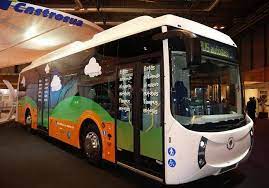The Infrastructure Bank Plc made the announcement on Monday that it will be partnering with the FEMADEC Group to deploy 500 buses powered by autogas (also known as compressed natural gas) in an effort to reduce the excessive cost of Premium Motor Spirit (PMS), which is more commonly referred to as petrol.
In light of the broad negative effects brought on by the nationwide increase in the cost of PMS, the parties involved in the transaction claim that the effort was conceived with the intention of providing citizens with travel choices that are dependable, cost-effective, and environmentally friendly.
The Infrastructure Bank (TIB), which was originally known as the Urban Development Bank of Nigeria Plc, was founded in 1992 in accordance with Decree No. 51 of the 1992 Constitution of the Federal Republic of Nigeria in order to promote the rapid development of infrastructure throughout the country. TIB was formerly known as UDBN.
Read also: US, Nigeria agree to deploy gas in push for renewable energy
The partnership with FEMADEC
In a statement regarding the bank’s partnership with FEMADEC, which was published in Abuja, the bank claimed that:
“The preliminary offer extended by TIB lays a solid foundation for the expansion of FEMADEC Group’s CNG bus fleet.”
“With plans to introduce 500 CNG buses within the next five years, commencing with an initial batch of 50 buses in the forthcoming year, this proposal stands poised to instigate significant change.”
“The acceptance of this proposition by FEMADEC Group, notably championed by Fola Akinnola, the Group Chief Executive Officer, is a testament to their zeal and dedication to this alliance.”
The bank also described the partnership as a “pivotal endeavour that is primed to redefine Nigeria’s public transportation landscape, offering dependable, cost-effective, and ecologically conscious travel alternatives for citizens, while harmonising with the nation’s broader sustainability ambitions.”
“This partnership represents a remarkable stride towards a more ecologically aware future for Nigeria’s transportation sector, highlighting the shared commitment of both TIB and FEMADEC Group to sustainable advancement and progress.”
It reaffirmed FEMADEC Group’s accomplishments in operating Compressed Natural Gas buses, including the existing fleet of 20 CNG buses under LAMATA, which showed their steadfast adherence to ecologically sound solutions, a commitment that predated the elimination of the fuel subsidy. In addition, it highlighted LAMATA’s existing fleet of CNG buses.
Additionally, the bank stated: “Their leadership within the CNG value chain is undeniable, and the new alliance with TIB underscores their foresight. This partnership seamlessly aligns with TIB’s sustainability objectives, echoing their resolute endorsement of the government’s net-zero and climate change agenda.”
“The bank’s aspiration to champion Nigeria’s infrastructure progress is evident in its endorsement of pivotal initiatives like this, yielding expansive positive impacts on both the environment and society.”
The bank asserted that as a top financial institution dedicated to promoting meaningful and sustainable infrastructure projects, it would continue to put in significant effort in the road towards the nation’s overall growth.
Autogas adoption will save N1.84tn – FG
According to the Federal Government of Nigeria, the transition away from the use of Premium Motor Spirit, more commonly known as petrol, and towards the usage of autogas will result in savings of around N1.84 trillion monthly for commercial vehicle owners.
This information was divulged in a document that was compiled by the Nigerian Institute of Transport Technology. In this document, it was indicated that a typical commercial Uber car could save N274,176 each month by running on autogas rather than petrol.
The document headed ‘Autogas Conversion – NITT Initiative and Strategy,’ was obtained by The PUNCH in Abuja on Tuesday at a one-day stakeholders’ engagement session that focused on autogas as an alternative fuel for transportation in Nigeria. The forum was held to discuss autogas as an alternative fuel for transportation in Nigeria.
According to the latest study from the transport institute, the total number of automobiles in Nigeria ranges anywhere from 12 million to 20 million, with 57% of those vehicles being used for commercial purposes.
More details
According to what was said there, if one uses the most conservative estimate of 12 million automobiles, then 57% of that amount is 6,840,000. When compounded with the savings of more than N270,000 per month that a typical commercial Uber car might realise if it were run on autogas, this indicates that the 6.84 million transporters could realise savings of around N1.84 trillion per month if they run their vehicles on autogas.
Oil marketers and other stakeholders in the transport and oil sectors had been designing methods to assist in decreasing the high cost presently being spent on fuel, as the stop in subsidy led to a surge in the pump price of petrol from N198/litre to over N500/litre. Since the removal of the subsidy on petrol, oil marketers and other stakeholders in the transport and oil sectors have been developing measures to help reduce the high cost currently being spent on fuel.
Autogas fuel, also known as Liquefied Petroleum Gas (LPG) or Compressed Natural Gas (CNG), is a mixture of hydrocarbons that can transition from a gaseous to a liquid state depending on whether it is compressed at moderate pressure or refrigerated.
The National Institute of Transport and Tourism (NITT) found that there would be a considerable decrease in the amount of money that motorists spend on fuel as a result of the widespread adoption and utilisation of autogas, which was also supported by oil marketers. The majority of drivers in Nigeria use fuel to power their automobiles.
